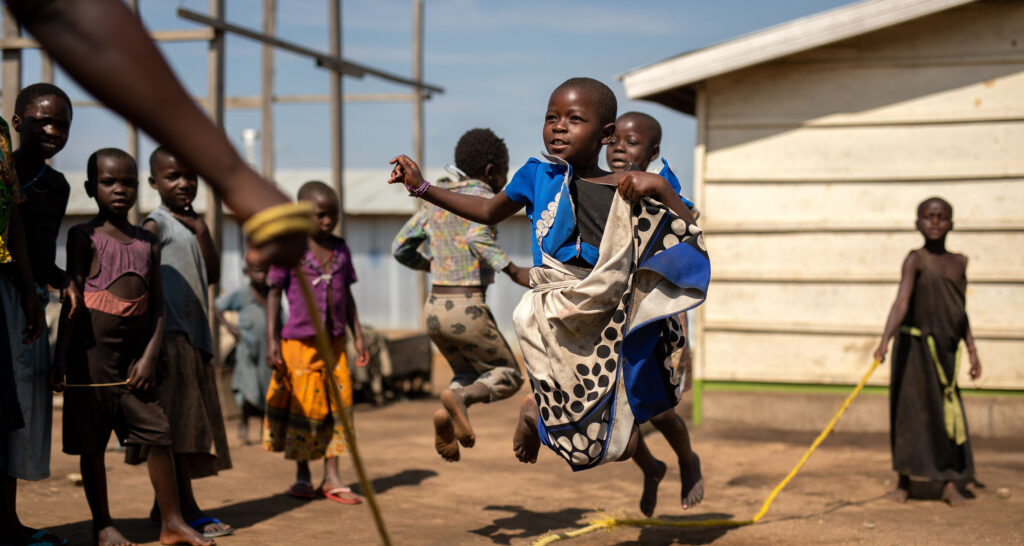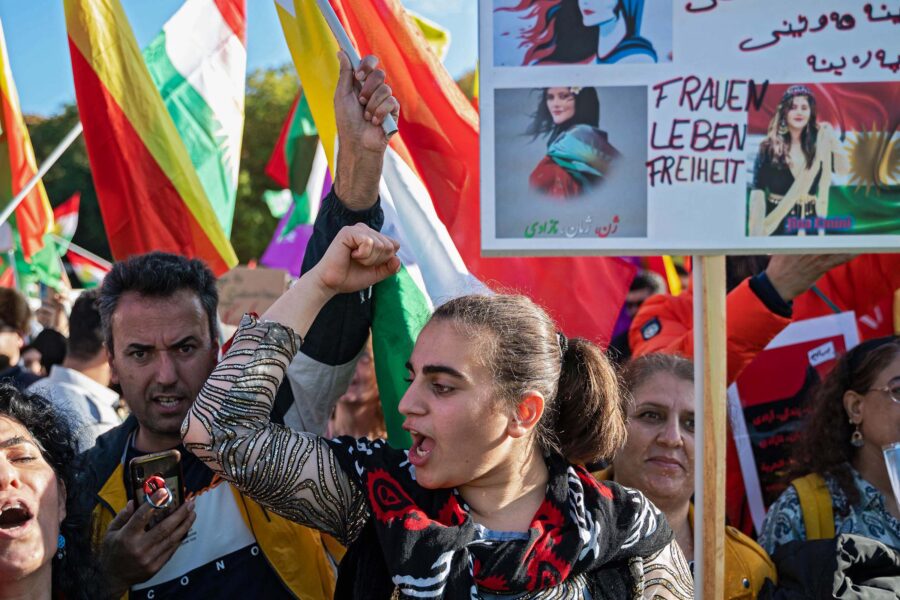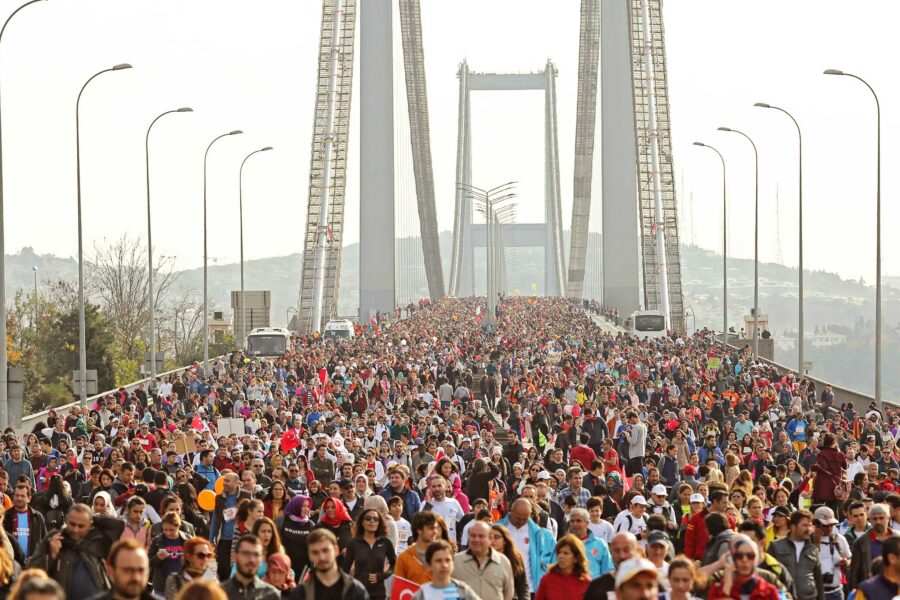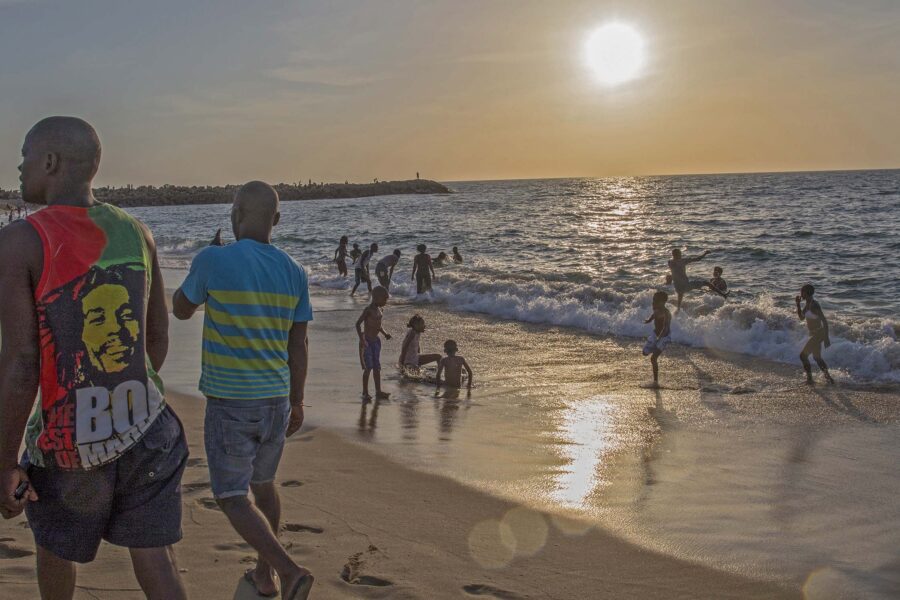Developing a humane response to displaced people
Climate change, the threat of famine, and conflicts are driving more people than ever from their homelands. While the international community’s response to the Ukraine refugee crisis has been notable for its scale, solidarity, and humanity, there is still much work to do to ensure a fair and humane asylum system for all
Migrants and refugees — Global

100 million. This is the unimaginable number of people forcibly displaced around the world today. New data reveals that 89.3 million people were forced to flee their homes last year, taking the global toll to over 100 million, inclusive of Ukraine. The IRC will relentlessly pursue its call to world leaders to take concrete action to alleviate suffering, increase resettlement efforts, and take diplomatic steps to address the root causes of displacement – not just around World Refugee Day, but every day.
Catastrophic displacement figures have become an annual norm, with violent conflicts, the threat of famine, and the impacts of climate change testing the resilience of millions in crisis zones worldwide. Some 274 million people are today in need of humanitarian assistance, an increase of 63% in just two years. The IRC’s 2022 Emergency Watchlist warns world leaders, policymakers, and concerned citizens not just where crises are deepening, but why – and what can be done to pull them back from the brink.
The vast majority of the crises highlighted in this year’s Watchlist result from a combination of factors. But they are not just a series of unfortunate events; they reflect a broader system failure:
- states are failing in their duties to their citizens
- diplomacy is failing to resolve conflicts
- the legal regime is failing to protect well-established rights for civilians
- humanitarian operations are failing to fill the widening gaps between humanitarian needs and funding
Communities living in many conflicts and crises around the world are also experiencing the catastrophic consequences of climate change. In regions such as the Horn of Africa and the Sahel, and in countries such as Afghanistan and Syria, more frequent and intense natural disasters and extreme weather are destroying livelihoods, uprooting people from their homes, and worsening humanitarian crises.
The countries featured in the IRC’s latest Watchlist did not cause the climate crisis, but they are paying the greatest cost for it. Of the 10 countries least prepared for climate change (according to ND-GAIN), six are on the 2022 Watchlist:
- Afghanistan
- Central African Republic
- Democratic Republic of the Congo
- Niger
- Somalia
- Sudan
Appropriate response
People who are forced to flee their homes do not resign themselves to exile by choice. Understanding the causes of displacement is critical to understanding what types of response are appropriate, identifying both short and longer-term solutions – and ultimately to ensure people have the resources to make the best decisions for themselves and their families.
Many people in displacement have suffered unthinkable trauma, including facing violence in their country of origin, or fear and uncertainty on their journeys in search of protection elsewhere. Women face specific risks of exploitation and abuse, and it is crucial that their needs and requirements are given particular attention. Responding to the root causes of displacement will require a range of actions – from ramping up conflict prevention measures, to increasing funding to mitigate climate change, and scaling up the provision of aid to the most fragile and conflict-affected countries.
However, the international community also has a duty to ensure that people who flee their homes are protected, and can recover and regain control of their futures. Refugees bring so much more than they carry. They arrive in their new communities with a wealth of intangible gifts: experiences and talents, hopes and dreams, culture, resilience, and determination. When welcomed properly, refugees make immense contributions.
If these gifts are to be fully realized, host societies must be supportive, inclusive, and welcoming. The solidarity displayed with refugees from Ukraine has been particularly remarkable – both from EU member states, and citizens who opened their homes. The Ukraine crisis has demonstrated that Europe and the EU institutions can welcome people fleeing conflict with respect and dignity when the political will exists to do so.
However, the stark reality is that people arriving in Europe fleeing equally devastating crises around the world, including Afghanistan and Syria, continue to face a very different reality. They are often left to languish in limbo, sometimes even in camps for years, are met with walls rather than welcome, and are isolated from their local communities.
For all refugees, there are lessons that must be heeded to ensure sustainable and effective integration. Coordination between states and civil-society actors will be key to developing a long-term approach to integration, which must start from day one. There are several ways in which this can be achieved.
Firstly, all integration programs – whether in healthcare, education, civil society, or local government – must provide effective and responsive services, be locally owned and led, and listen to the needs, preferences, and aspirations of displaced people.
Much of the IRC’s work around the world focuses on education, access to the labor market, and strengthening health systems at the subnational and local level, as well as strengthening civil society. To design effective responses, refugees must be involved and included as these programs are designed and put into practice.
Secondly, displaced people must be empowered to shape the decisions that affect their lives. Information is key – yet refugees are often not well informed about their rights, services they are able to access, or asylum procedures. The IRC’s Signpost project seeks to address this problem by providing digital channels for people in difficult or crisis situations, featuring accurate, accessible, and timely information, and access to essential services. Signpost’s digital information has reached over 20 million people and created empowering engagements with over four million people in 12 languages and 18 countries, including Iraq, Greece, Pakistan, Niger, and Afghanistan. It has now launched in Poland and Germany to support people fleeing Ukraine.
Thirdly, refugees must have access to opportunities to rebuild their lives. The chance to participate in trainings and join the labor market is critical to rebuild a sense of stability, self-confidence, and hope for the future. Particular attention should also be given to protecting refugees’ mental health and well-being. After making horrifying journeys and experiencing often indescribable suffering, refugees need psychosocial support to integrate in their new community and begin to heal their trauma.
In Ukraine, for example, the IRC is working with partners to launch Safe Healing and Learning Spaces for children. These spaces provide a safe, caring, and predictable environment for children and adolescents in conflict and crisis settings, supporting them to both recover and thrive in later life.
Ensuring integration works
When successful, integration is a decisive factor in the acceptance of refugees and asylum seekers into new societies and the easing of tensions within the population. Governments, NGOs like the IRC, and civil-society groups are also responsible for ensuring that integration works – demonstrating the incredible contribution that refugees make to our societies, and fostering a peaceful intercultural dialogue that can only be fruitful. The recent response to the Ukraine crisis in Europe highlights how important the contribution of citizens can be to help people fleeing conflict.
The international community, including the EU, has a great deal to learn from its effective response to the Ukraine crisis. Now, it must finally put in place a fair and humane asylum system that upholds the rights of all refugees, regardless of their country of origin. There are no excuses for inaction.





